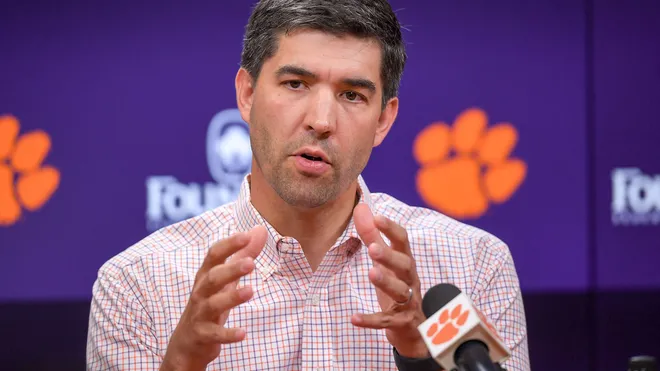
Five months after Clemson initiated a lawsuit against the ACC as a preliminary step towards possibly joining another conference, Tigers athletic director Graham Neff continues to reassure the school’s coaches, athletes, and staff that they will remain committed to their current conference. Neff emphasizes that Clemson will act with “incredible professionalism” and handle day-to-day matters with the understanding that, despite the ongoing, costly, and contentious legal dispute over the ACC’s grant of rights and exit fees, normal operations should proceed as usual.
During a recent news conference ahead of the new athletic year, Neff reiterated his consistent message, avoiding specifics about the legal battle while acknowledging its significance. Following ACC commissioner Jim Phillips’ declaration that the conference would resist lawsuits from Clemson and Florida State “as long as it takes,” Neff echoed a similar sentiment, stating, “We’re going to do what’s best for Clemson.”
As Neff approaches his three-year mark as Clemson’s athletic director, having succeeded Dan Radakovich in fall 2021, he has closely witnessed the Clemson-ACC legal conflict. The core issue revolves around the enforceability of the ACC’s grant of rights, which secures media revenue from ACC schools’ home games through 2036 as part of an ESPN agreement. Clemson, which has been part of the ACC since 1953, signed this agreement in 2013 and 2016. However, as the Big Ten and SEC secured more lucrative TV deals that could provide their schools an additional $30 to $40 million annually, Clemson decided to take the unprecedented step of suing its own conference.
Graham Neff, who has consistently attended hearings for both the Clemson vs. ACC lawsuit in South Carolina and the ACC vs. Clemson lawsuit in North Carolina, declined to comment on Clemson’s specific legal strategy following a summer filled with court developments. The university’s attempt to dismiss the ACC’s countersuit in North Carolina was denied by a judge on July 10. Clemson is now appealing this decision to the North Carolina Supreme Court, a process that could take 12 to 18 months, according to one university lawyer. Additionally, on July 12, a South Carolina judge allowed the original case filed in Pickens County to proceed, which is seen as a positive development for Clemson and means the two cases will run concurrently for the time being.
Neff noted that the landscape of college athletics realignment is “more active than ever,” and he monitors it daily. Over the past three years, various reports have linked Clemson to potential moves to the SEC and Big Ten. Although the speculation has lessened this summer, new reports suggested Clemson and Florida State had explored conversations with the Big 12, whose commissioner, Brett Yormark, has been proactive about expansion. However, Clemson remains an ACC member for now. “There’s plenty written,” Neff said. “I read a lot of it – not all of it. It’s part of my job to stay informed about national conversations and moving parts.”
When asked if Clemson’s potential realignment decisions are on hold until the court battle with the ACC is resolved, Neff replied, “I’ll pass on the legal sequencing of that only to say that we’re going to continue to have our legal team handle the legal process, act with professionalism, remain great members of our current conference, and stay well-informed about national developments.”
Leave a Reply